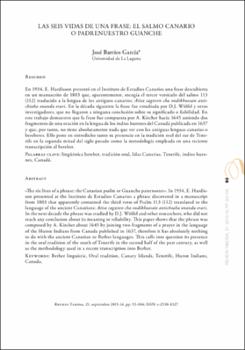Las seis vidas de una frase: el salmo canario o padrenuestro guanche
Autor
Barrios García, JoséFecha
2017Resumen
En 1934, E. Hardisson presentó en el Instituto de Estudios Canarios una frase descubierta
en un manuscrito de 1803 que, aparentemente, recogía el tercer versículo del salmo 113
(112) traducido a la lengua de los antiguos canarios: Atisa cagnren cha ondikhuesate antichiaha
onanda erari. En la década siguiente la frase fue estudiada por D.J. Wölfel y otros
investigadores, que no llegaron a ninguna conclusión sobre su significado o fiabilidad. En
este trabajo demuestro que la frase fue compuesta por A. Kircher hacia 1645 uniendo dos
fragmentos de una oración en la lengua de los indios hurones del Canadá publicada en 1637
y que, por tanto, no tiene absolutamente nada que ver con las antiguas lenguas canarias o
bereberes. Ello pone en entredicho tanto su presencia en la tradición oral del sur de Tenerife
en la segunda mitad del siglo pasado como la metodología empleada en una reciente
transcripción al bereber. In 1934, E. Hardisson
presented at the Instituto de Estudios Canarios a phrase discovered in a manuscript
from 1803 that apparently contained the third verse of Psalm 113 (112) translated to the
language of the ancient Canarians: Atisa cagnren cha ondikhuesate antichiaha onanda erari.
In the next decade the phrase was studied by D.J. Wölfel and other researchers, who did not
reach any conclusion about its meaning or reliability. This paper shows that the phrase was
composed by A. Kircher about 1645 by joining two fragments of a prayer in the language
of the Huron Indians from Canada published in 1637, therefore it has absolutely nothing
to do with the ancient Canarian or Berber languages. This calls into question its presence
in the oral tradition of the south of Tenerife in the second half of the past century, as well
as the methodology used in a recent transcription into Berber.





